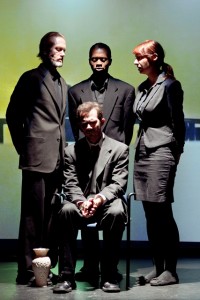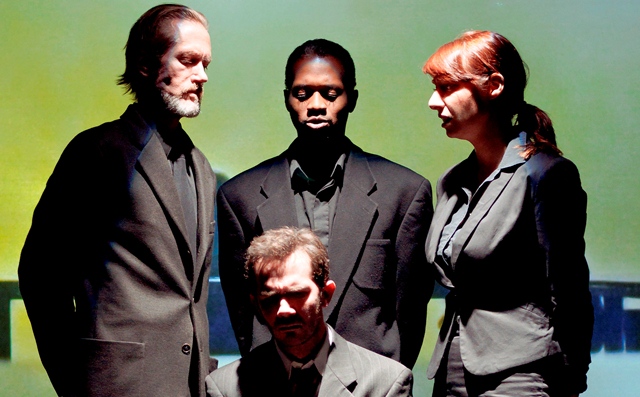Luna Theater Company’s thought-provoking contribution to the Philly Fringe Live Arts Festival is English playwright Fin Kennedy’s fast moving and intense, HOW TO DISAPPEAR COMPLETELY AND NEVER BE FOUND.

Members of the cast of Luna Theater Company's HOW TO DISAPPEAR COMPLETELY AND NEVER BE FOUND: (standing left to right): Mark Cairns, Steve Wright and Jennifer MacMillan; (seated) David Stanger. Running as part of the Philly Fringe Live Arts Festival at the Playground at the Adrienne through Sept 18. (Photo credit: Aaron Oster)
When one’s life seems to be spiraling out of control it might be tempting to consider running away from distressing circumstances rather than staying and dealing with them head-on. The fact that thousands of persons do just that every year in the U.S. and Europe intrigued Kennedy, who carefully researched this subject—even finding and reading Doug Richmond’s 1996 book titled, “How to Disappear Completely and Never Be Found.” According to this and several other sources, one way to understand one’s identity is to consider it comprised entirely of the paper trail one leaves behind from birth certificate, to social security number, driver’s license, credit cards, passport, and so on. Given this perspective, it should be possible to adopt a new identity by obtaining the first piece of paperwork, a birth certificate, from someone of similar age no longer living and then step-by-step confabulating one’s new identity as the various paper trail essentials are assembled.
But, can one successfully transform one’s identity from the outside in? Upon what is one’s identity truly constructed? Kennedy’s examination of these critical themes combines elements of tragedy with comedy in a 90 minute play which won the 2006 Annual Arts Council John Whiting Award—the only time in 40 years an unproduced play has been chosen. It has since been produced in London, Melbourne, and at least three times in the U.S., before coming to Philadelphia as part of the current Philly Fringe Live Arts Festival.
When Charlie, a 29 year old, totally stressed out, cocaine-addicted, brand manager in an advertising agency seeks advice from an older friend of his deceased mother, he hears the following: “What makes you who you are, Charlie? A name? An address? A random collection of experiences, a few memories? You are who you can prove you are. You are what people think. And that’s the easiest thing in the world to change.”
Mike, the older family friend, played brilliantly by classical actor Mark Cairns, carefully instructs Charlie to leave behind all vestiges of his former life; to drop all former contacts, friends, everything, or else the transition to a new identity will be incomplete and thus vulnerable to discovery. Thus, it seems, one’s identity may not, after all, be comprised merely by the material trappings which in modern society gradually overtake one as if in a Kafkaesque metamorphosis. Identity may, instead, be better defined by our actions in relationships with the many others with whom we interact in the daily business of living in a complex, ever changing social ecology.
David Stanger turns in an energetically convincing performance as Charlie, whose brief attempt at becoming “Adam” only brings him closer to an ultimate realization of who he has been all along. Mark Cairns, Jennifer MacMillan and Steve Wright each portray a variety of characters central to Charlie’s life; most of whom have legitimate interests in connecting with the identity Charlie is struggling to shed. Each of these actors is exceptionally convincing in their role transitions. Bethany Ditnes portrays the only character that seems to really know the truth about the life of Charlie. Unfortunately, her lines are frequently lost due to vocal projection problems that were thankfully not present for the other actors who managed to project their lines, along with English accents, audibly.
Special mention must be made of Michael Long’s creative use of a large upstage screen upon which various scenes relevant to changing settings throughout the play are projected. This technique substituted for actually building three dimensional scene sets, which would have been exceedingly troublesome given the small stage available. Accompanying this use of projected imagery is a well-coordinated collection of sound effects designed by Aaron Oster. Gregory Scott Campbell directs, assisted by Michael Durkin.
There is plenty of opportunity to see this truly exciting production since it runs the length of the Fringe Festival, through September 18. To listen to a recent interview with the playwright, click here and then click “DOWNLOAD” beneath the article title to hear public radio personality Madeleine Brand’s discussion with Fin Kennedy.
HOW TO DISAPPEAR COMPLETELY AND NEVER BE FOUND
By Fin Kennedy
September 1-18, 2011
Luna Theater Company
Playground at the Adrienne
2030 Sansom Street
Philadelphia, PA 19103
www.lunatheater.org



1 comment
[…] Stage Magazine Review : […]